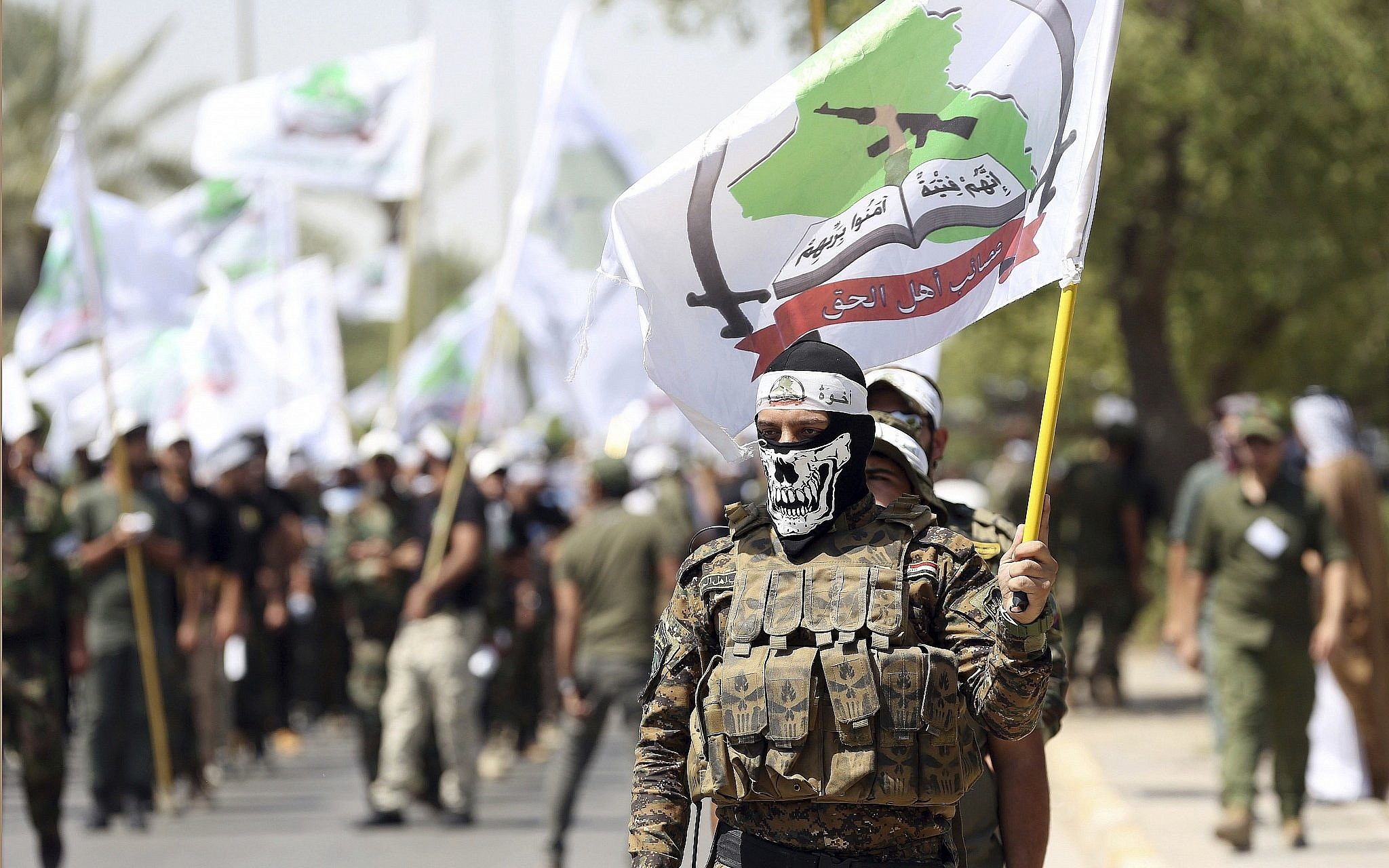Pro-Iran militias a time bomb Al-Kadhimi must defuse
https://arab.news/8dzp4

Iraqi Prime Minister Mustafa Al-Kadhimi is facing a pressing challenge that threatens to once again push the country into a sectarian furnace. He needs the political will and the means to isolate and neutralize tens of renegade pro-Iran militias.
Two events that took place on Saturday underlined the limited capabilities of the federal government and its military and security arms. The first was the burning of the central Baghdad offices of the Kurdistan Democratic Party by loyalists of the Popular Mobilization Units (PMU). The second was the gruesome execution of at least eight citizens in Salahuddin province, allegedly by a pro-Iran militia. Four other victims remain unaccounted for. The kidnappings and executions in Salahuddin were said to be in retaliation for the killing a few days before of a member of a pro-Iran militia in an attack blamed on Daesh.
The massacre has focused attention on the presence of pro-Iran militias in liberated Sunni provinces and their refusal to allow tens of thousands of displaced people, mostly Sunnis, to return to their homes. This case underlines the limitations of the federal government in Baghdad in terms of extending its authority over a number of provinces that the PMU entered to clear them of Daesh terrorists between 2014 and 2017.
Since they were formed back in 2014 to help the Iraqi Army battle Daesh, some of these militias have been incorporated into the state security bodies, while others continue to act outside of government control. Numbering about 40, some have been accused of carrying out atrocities against Sunnis in liberated provinces. Most acknowledge fealty to Iran’s Islamic Revolutionary Guard Corps (IRGC) and were led by Iranian Gen. Qassem Soleimani until his January assassination in a US airstrike.
The Salahuddin massacre prompted Al-Kadhimi to visit the province in a bid to calm angry tribal leaders. “Terrorism and all criminal acts will be prosecuted under the law,” he said. But it remains to be seen if his security forces will be able to flush out the militiamen associated with Asa’ib Ahl Al-Haq, one of the most militant groups on the scene today with direct ties to Iran.
Asa’ib Ahl Al-Haq and Kata’ib Hezbollah have been responsible for much of Iraq’s destabilization, especially after the killing of Soleimani. Both have been accused of targeting the Green Zone in Baghdad with Katyusha rockets aimed at the US Embassy there. The government has been so ineffective in protecting diplomatic and government offices that US Secretary of State Mike Pompeo threatened last month to close down the American Embassy unless the attacks are halted.
These two militant groups have stopped their attacks for now. But, driven by Iran, they continue to pose a threat to the US presence at a time when Washington is increasing its diplomatic and economic pressure on Tehran.
The attack on the Kurdistan Democratic Party office in Baghdad is said to have come after former Foreign Minister Hoshyar Zebari called on Al-Kadhimi to cleanse Iraq of the PMUs. But observers believe that the real reason was the agreement reached two weeks ago between the federal government and the Irbil authority to co-manage the Sinjar district, thus ending the militias’ presence and allowing thousands of mainly Yazidi refugees to return to their homes. The pro-Iran militias have been in Sinjar since 2015, refusing to allow displaced residents to return and using the district as a gateway to Syria.
But dismantling the militias is proving to be an impossible task for the Baghdad government. Last month, Iraq’s top cleric, Ayatollah Ali Al-Sistani, called for the disbanding of all militias, six years after urging his followers to form them in response to the threat of Daesh. But, just like its namesake in Lebanon, Kata’ib Hezbollah has become a state within a state, with its own agenda that is in line with that of Tehran.
The challenge for Al-Kadhimi now is the trust gap with his own commanders. Over the years, and especially under the rule of former Prime Minister Nouri Al-Maliki, pro-Iran activists were allowed to infiltrate the army and security bodies, in addition to holding key government ministries. Al-Kadhimi may have the political will to purge Iran loyalists from the government, but does he have the means to do it?
Dismantling the militias is proving to be an impossible task for the Baghdad government.
Osama Al-Sharif
Any future clash between government forces and the militias will be bloody, messy and unpredictable. Failing to drive the militias out of Sunni provinces will fan the flames of sectarian violence. The irony is that a majority of Iraqis, even in Shiite provinces, are fed up with Iranian interference. Massive corruption and the abuse of state resources can be traced to pro-Iran politicians and activists.
As Al-Kadhimi ponders his options, the US also finds itself in an unenviable position. On the one hand, President Donald Trump wants to end Washington’s costly military adventure in Iraq, while on the other he does not want to abandon the country to the Iranians. This sums up Iraq’s predicament today and, after all is said and done, these militias are ticking time bombs that threaten to destroy what is left of the Iraqi state.
- Osama Al-Sharif is a journalist and political commentator based in Amman. Twitter: @plato010









































